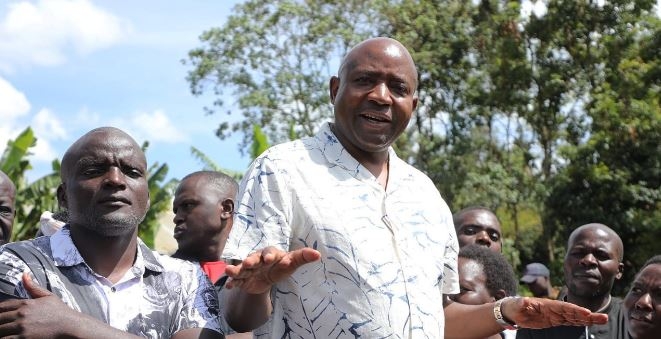

The government will spend Sh648 million to replace
decades-old asbestos-cement water piping at the Aguthi Water Project in Tetu, Nyeri county,
over healthy safety concerns.
Cabinet Secretary for Water, Sanitation and Irrigation Eric Mugaa told the press in Nyeri the government plans to replace the ageing conduits which date back to the 1970s with modern high density polyethylene pipes, which are environmentally friendly.
The transformation will also boost water supply in the area and cut costs in terms of repairs owing to the durability of HDP piping.
Scientists believe asbestos when used in roofing and piping could be a possible link to gastrointestinal cancers in humans.
“The Aguthi Water Project was launched in the 1970s using asbestos-cement pipes, which are quite old. Asbestos pipes are believed to be the cause for some of the health problems we are facing like cancer and therefore we want to replace them.
We also want to ensure we have a water treatment plant in the area that will ensure people of Tetu and other areas get clean and safe water for drinking and other uses,” Mugaa said.
The CS has also decried the level of vandalism affecting some of the water projects in the country and called for concerted efforts from both leaders and the public to end the wanton destruction.
Mugaa said the destruction of major water components such as pipes, water valves and siltation was undermining government efforts to provide water for irrigation to farmers and in the process hampering efforts in attaining food security in the country.
The challenge has forced the government to embark on expensive rehabilitation efforts in a number of projects such as Changachicha Irrigation Project in Othaya, where critical infrastructure such as pipes and valves were stolen by unknown persons.
“The Changachicha Irrigation Project in Othaya was designed to ensure that more than 1,600 people benefited from the water for farming. But if you are destroying pressure valves at the intake regularly the water doesn’t reach the farmers," the CS said.
"This time we have come to do the repairs and once the repairs are done we are calling upon everyone, and especially the area leadership, to talk to our people and ensure the systems are sustainable."
The Changachicha project was launched in April 2021 and commissioned by President Dr William Ruto in February 2023.
The objective of the project was to boost production of high-value commercial vegetables such as cabbages, kales, tomatoes, spinach, and carrots by farmers using sprinkler irrigation system.
The initial works entailed a conveyance pipe of 5,850 meters long, three main lines of 19,950-meter HDPE pipes, distribution lines, feeder lines and an infield system.
Once complete, the project was supposed to benefit about 2,000 people directly and another 10,000 indirectly.
Mugaa said the National Irrigation Authority is working closely with all stakeholders at the grassroots to protect water projects in the counties from rampant vandalism.
He has urged local leaders to help address the menace among the public to avoid unnecessary disruption of water due to vandalism.
“We shall institute area operation and maintenance for every irrigation system through the Irrigation Users Association. These groups of farmers will also form a committee that will ensure there is routine maintenance works at the water intake and clearing of sediments," the CS said.
"This way we shall not have to wait until water fails to reach the farmers in order to respond to the problem."















